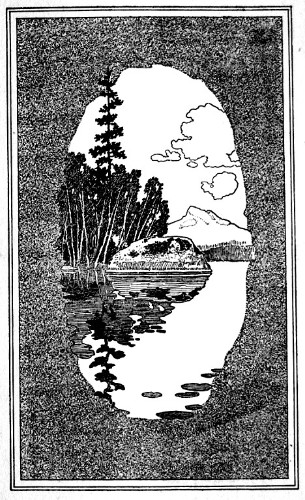
CHAPTER IV
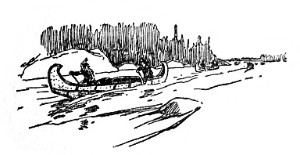
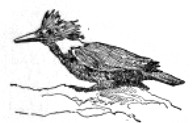
Jimmy ran as hard as he
could in the direction
of the firing.
When he arrived out of breath at the point, he saw in the middle
distance a
flotilla of canoes working its way slowly against the current. His own
friends
were busily reloading, and as he watched, another volley rang out,
which was
immediately answered by the approaching strangers. The disappointing
part,
however, was that the muskets were all pointed skyward. And in a few
minutes,
when the new canoes has reached the point, their occupants stepped
ashore and
were greeted solemnly with much hand-shaking.
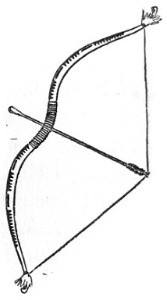
The band consisted of fifty
or sixty grown people and a sprinkling of children. They were shorter
and
broader faced than Jimmy's friends, and, as he soon discovered, talked
a
different language. The men were immediately
conducted to the clearing, while
the women began unloading the canoes. In a few hours another camp had
been
established a hundred feet or so from the old one, and then began an
interchange of stately visits between the men, of giggling gossipy
meetings by
the women, of fights and final reconciliations among the dogs. With the
children it was very much the same. At first they circled warily about
one
another, then they quarrelled, then they became fast friends.
The Ojibways gave the Crees
food from the stores they had accumulated; the Crees in return
presented
various seaside luxuries, such as smoked geese and dried
salt-water fish.
Jimmy was delighted to receive from a little Cree boy a pair
of stiff
moccasins made out of seal-skin, with the fur on the inside; and to be
able to
give
in return two blunt-headed
arrows
of maple -- a wood unknown so far north.
Then followed the long lazy
days of the permanent camp. Jimmy and his companions found the
pools where
there was no current, and there they spent every day in and out of the
water.
Jimmy was tanned almost to the color of his Indian friends by the hot,
north-country sun. They fished in the riffles. They explored the woods
roundabout until they knew every inch of it for five miles, and by an
infinite
patience and many trials, they managed to kill a respectable
number of the
cock partridges, the spruce-grouse, and the brown ptarmigan. They set
their
traps for muskrats, and looked with longing eyes on the trails
of mink and a
certain beaver colony, but the elders sternly forbade them to
disturb the
fur-bearing animals at this time of year. But best fun of all was the
game of
War Party.
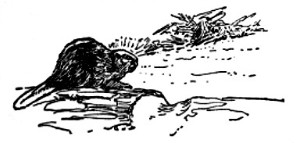


Asádi and one of
the Cree
boys would choose sides. Each boy would be armed with two or three
blunt arrows
whose points had been padded with moss, bound securely with buckskin.
One party
would disappear in the woods, and after an interval the other would
follow.
Then were ambushes, surprises, crafty retreats. The children
glided through
the forest with all the stealth of the wild animals
themselves. They lurked
behind logs,
watching with keen bright
eyes. They tracked the enemy, or covered their own trails in
order that
they might not be tracked in
turn. And at
any moment you were likely to be startled by the sharp twang!
of a bow
and bruised severely by the heavy blow of an arrow. For although the
missiles
were padded to prevent actual injury, they hurt enough to make it a
real object
not to be "killed"; for when you were killed, you had to return to
camp and play with the little girls.
Of course, Jimmy had neither
the inherited nor the acquired skill, so much of his time he
spent in camp.
But he improved rapidly, and the certainty of being black and blue in a
fresh
place added excitement to the game. And, oh, glorious thought!
twice he
"killed" members of the opposing party. Besides which he liked
the
little girls. When they were not helping their mothers they were very
kind to
him, and showed him their rag dolls and taught him divers interesting,
quiet
camp games. Some of them he liked very much.
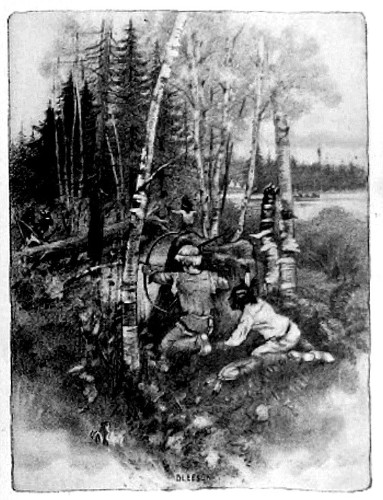
"The children glided through the forest."
And in the camp life itself
there was always much to attract his attention. The women were making
buckskin,
were ornamenting with beads various articles of
clothing, and the men were
conducting, inside the big lodge made of poles and branches, some
mysterious and
noisy ceremony.
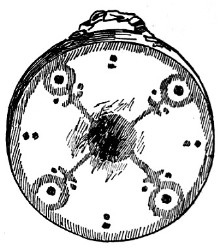
Jimmy never got a glimpse of
what was going on inside, but he was content to sit by the hour in the
hot sun,
listening to the
modulated rise and
fall of weird minor songs, the clatter of bones, the boom of drums, the
shuffle
of hands and feet. Every once in a while one of the men would appear
for a
moment at the doorway, his gaze exalted, his features
painted in brilliant
stripes or dots, his form dressed all in fringed buckskin lavishly
ornamented
with beads. And it was a pure delight at last, when the conjuring was
over, to
see the strangely clad men come forth into the gathering dusk and file
silently
to their teepees. Jimmy's little heart alwa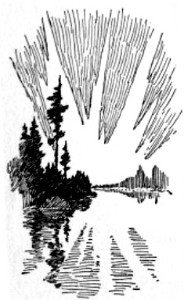 ys
sensed a thrill at what
he
somehow dimly felt to be a reincarnation of a glorious past. ys
sensed a thrill at what
he
somehow dimly felt to be a reincarnation of a glorious past.
Now the days were very long.
The sun did not set until nearly nine o'clock. And at night Jimmy was
astonished and filled with awe by the brilliant aurora that shot its
many-colored flames far over the zenith.
Among the older men of the
Cree band Jimmy made no friends. This was natural, for a brave had
little time
for a child. But of course his presence was remarked by them, and
received much
discussion.
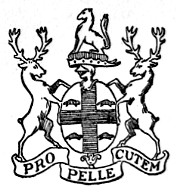
Now it happened that in the Cree
band was a French
half-breed,
Antoine Laviolette, who in winter was a post-keeper for the
Hudson Bay
Company, but who in summer preferred to travel with his savage kinsmen.
One
evening Jimmy was vastly astonished to be addressed by this man. It was
the
first English the little boy had heard since old Makwa had questioned
him.
"'Ullo!" he said;
"how you do?"
"Hullo! " replied
Jimmy.
In ten minutes they were
chatting together familiarly. And from that time on, Jimmy had
a new interest
in the long twilights after the evening meal had been eaten.
For Antoine
Laviolette was inclined by race to talk, and by nature to talk
well, and he
liked an appreciative audience.
"Jeemy!" he would
call. "Com' here! You evaire hear 'bout dose salt water, how she is
come
to be no good for drink?"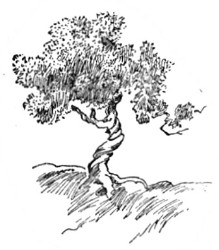
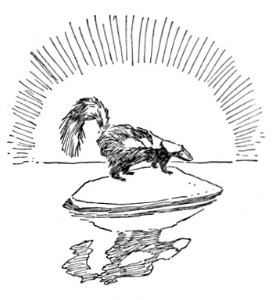
And then Jimmy, wide-eyed,
would hear of the Animal Council and its plottings against Si-kak, the
great
skunk, and how the carcajou helped to
kill him, but was
defiled with
the oil, and how the carcajou in washing himself tainted the sea-water
so that
it is unfit to drink. Or he learned why the great Manitou twisted some
of the
trees so their wood does not split straight, or why the ermine's fur changes
from red to white in winter. Or he
heard all about Hiawatha, just as you can read about him in Longfellow
to this
day, the same legends with the same names. It was all very wonderful to
him,
and it brought very close to him the animals of the woods. He came to
look on
them as the Indian does, not as inferior to himself, but merely as
different;
or, to put it the other way, he grew to consider himself and his
companions as
animals of another sort, speaking a different language, and living a
different
life, but not essentially of different race.
So he understood why when a
beaver was killed for the Moon Feast, a fillet braided of worsted and
doeskin
thongs was tied around the animal's tail, and why Ta-wap, the hunter,
dressed
in his best clothes before going out to kill a bear, and why the
cleaned skulls
of some beasts were placed on stakes near running water. For though it
was
necessary that these creatures die, the Indians did such
honors to their
spirits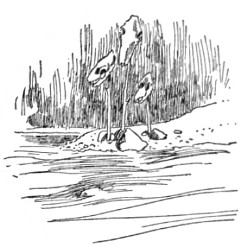 . .
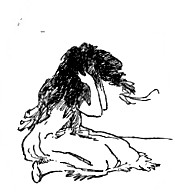
And now in the Berry Moon a
sad event sobered the camp. For little Si-gwan
ate of a
poisonous mushroom, and in spite of the conjuring and the
herbs and the
charms, she grew sicker and weaker until she died. Then in the teepee
of her
people was the sound of wailing. The women let loose their hair and
scattered
ashes on their heads and raised their voices in lamentations, while
Au-mick,
the little girl's father, painted his face to represent mourning.
The burial services took
place in the evening between two great fires. The Indians squatted
soberly
cross-legged in a circle, all dressed in their finest garments. In the
centre
was a raised platform of boughs on which lay a birch-bark
coffin. Below it sat
the bereaved family, their hair and garments in disorder, their eyes
downcast.
Jimmy huddled near his friend, Antoine Laviolette. In the stillness,
the awe of
dark and of firelight and of dancing shadows and of a grave, silent
people
overflowed his little heart.

After a long interval old
Makwa advanced to the centre of the circle.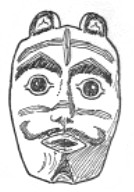
"Oh, Wábisi, my
little
sister," said he, addressing the mother, "it is not well that you
grieve. For if our daughter had grown, she would many times have been
hungry
and cold and weary. But now where she has gone there is no hunger nor
cold, and
there is no weariness. Therefore you should be glad." He stooped and
slashed his knife twice through the birch bark of the coffin. "Oh,
Kitche
manito!" he cried, "these places do I cut that our daughter's spirit
may come and go as she wills it, that she may visit us sometimes, that
she may
see our little sister, Wábisi, when she is very sad." Again
he turned to
the mother. "Our daughter is gone, oh, my little sister," he continued,
"but on the day when Pau-guk1
takes you, then you shall see her
again. But she will be all changed, and you will not know her, but when
you
enter that Land of the Hereafter, then you must sing always this little
song,
and so she shall know you." In a surprisingly clear and true tenor old
Makwa chanted a weird minor air with tearful falling cadences. "And
when
she hears that song," he went on, "then she will answer it with
this." He sang through another little song. The long-drawn plaintive
chords
gripped Jimmy's throat so that he sobbed aloud. " And in that way you
shall know one another."
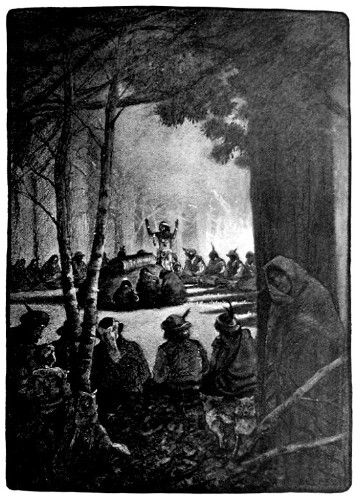
"Old Makwa advanced to the centre of the circle."
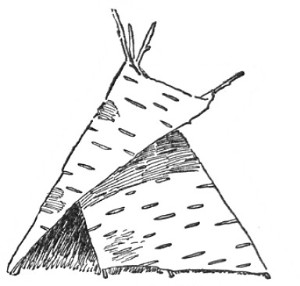
The young men bore the
coffin to a grave that had already been dug a short distance away in
the pine
groves. After the earth had been filled in, three of the women knelt
and deftly
put together a miniature wigwam of birch bark, complete in
every detail. Then
old Makwa began again to speak, addressing the grave in a low tone of
confidence.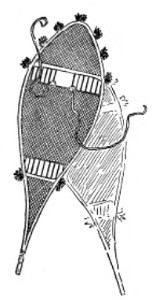
"Oh, Si-gwan, our
little daughter," said he, "I place this bow
and
these arrows in your lodge that you may
be armed on the Long Journey.
"Oh, Si-gwan, our
little daughter, I place this knife in your lodge that you may
be armed on the
Long journey.
"Oh, Si-gwan, our
little daughter, I place these snow-shoes in your lodge that you may be
fleet
on the Long Journey."
And in like manner he
deposited in the little wigwam extra moccasins, a model canoe and
paddle, food,
and a miniature robe.
Then quietly they all returned
to camp, -- all but Wábisi, the
bereaved mother. She huddled on the ground by
the grave,
her blanket over her head.
Jimmy dreamed that night of the silent, motionless figure of desolation.
For three whole days and
nights the Indian woman mourned her child, then arose and went about
her
ordinary duties with unmoved countenance. And the little grave was left
to the
sun and snow and rain and the mercy of an all-explaining,
all-forgetting
Nature.
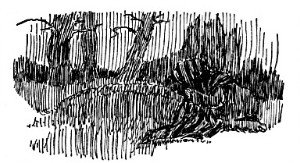
And now the time had come,
at the latter end of the Berry Moon and just before the
Many-Caribou-in-the-Woods Moon, to break up the permanent camp. The
Crees had
to return to Moose Factory at the Hudson Bay, thence to set out for
their
winter trapping grounds; the Ojibways were now to retrace their steps
to Chapleau
for the purpose of receiving their treaty money from the Canadian
government.
Jimmy was not aware of the meaning of this, nor that when once
the canoes
should breast the current, he would be headed toward the railroad
again. He
only knew that a move was imminent, and was glad of it. The home camp
was fun,
but the adventures of travelling were better. He never knew how close
he came
to being taken by the Crees many, many miles farther north to his
supposed home
at York Factory on the shores of the Hudson Bay. Antoine
Laviolette was the
lucky element in that. He it was who told the headmen that the child
was not a saganash,2
as they had
supposed, but a kitch-mokamen,3
who lived far south of the
Ojibway country. So when the time came to part,
Jimmy remained with his old friends.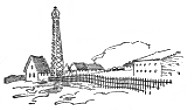

The
Ojibways broke camp first, as they had the
longer journey to go. When the
canoes
were all loaded, the Crees came down to wish them a good journey. And
then,
after the little craft were actually afloat, a dozen young boys dashed
into the
water for the purpose of dropping presents of fish, game, and
ornamented work
into the boats of the departing tribe. They waited thus until the
latest
possible moment in order that the recipients of the gifts
might not feel
called on to return something of equal value. A volley of musketry was
answered
by another from the canoes. The flotilla moved slowly forward against
the
current.
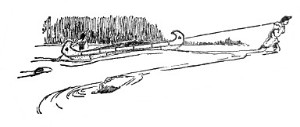
_______________________
1
The Death Spirit.
2 Englishman.
3 Big knife, i.e. American.
 Click
the
book image to turn
to the next Chapter.
Click
the
book image to turn
to the next Chapter. |

